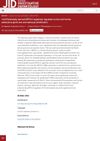 August 2023 in “Journal of Dermatological Science”
August 2023 in “Journal of Dermatological Science” A specific RNA molecule blocks hair growth by affecting a protein related to hair loss conditions.
[object Object] 
Not having the gene PLAAT3 leads to fat loss, high insulin resistance, and abnormal fat levels in the blood due to a disruption in fat cell development and function.
September 2017 in “The journal of investigative dermatology/Journal of investigative dermatology” N-acetyl-GED may help prevent and partially reverse a process that leads to scarring hair loss.
April 2020 in “The FASEB Journal” Loss of Rap1 protein speeds up heart aging in mice.
19 citations,
September 2021 in “British journal of dermatology/British journal of dermatology, Supplement” Activating PPAR-γ signalling can protect hair follicle stem cells from damage caused by chemotherapy.
 December 2024 in “Journal of Cosmetic Dermatology”
December 2024 in “Journal of Cosmetic Dermatology” ME1 and PPAR signaling may influence hair loss in androgenetic alopecia.
September 2019 in “The journal of investigative dermatology/Journal of investigative dermatology” PPARγ signaling modulation can protect hair follicle stem cells from chemotherapy-induced damage.
 238 citations,
March 2013 in “Development”
238 citations,
March 2013 in “Development” Fat cells help recruit healing cells and build skin structure during wound healing.
 46 citations,
April 2008 in “Archives of Dermatological Research”
46 citations,
April 2008 in “Archives of Dermatological Research” Substance P may worsen acne by increasing inflammation, but corticosteroids might help by reducing this effect.
 45 citations,
February 2019 in “Journal of Affective Disorders”
45 citations,
February 2019 in “Journal of Affective Disorders” Melatonin improved mental health and metabolism in women with PCOS.
44 citations,
January 2013 in “BMC Dermatology” TGFβ signaling prevents sebaceous gland cells from producing fats.
 25 citations,
June 2014 in “Journal of Endocrinology/Journal of endocrinology”
25 citations,
June 2014 in “Journal of Endocrinology/Journal of endocrinology” Human sebaceous glands contain enzymes that affect androgen production and may influence sebum production and acne.
20 citations,
January 2015 in “Biochimica and biophysica acta. Molecular and cell biology of lipids” Lysophosphatidic acid affects sensory neurons and may cause neuropathic pain and itch.
 7 citations,
February 2018 in “Journal of Investigative Dermatology”
7 citations,
February 2018 in “Journal of Investigative Dermatology” Fat tissue and a specific protein are crucial for healthy hair growth and maintenance.
 6 citations,
April 2022 in “Frontiers in cell and developmental biology”
6 citations,
April 2022 in “Frontiers in cell and developmental biology” The research identified key proteins and genes that may influence wool bending in goats.
 4 citations,
February 2018 in “Journal of Investigative Dermatology”
4 citations,
February 2018 in “Journal of Investigative Dermatology” The document concludes that a protein involved in hair growth may link to baldness and that more research is needed on its role in hair loss and skin cancer treatments.
[object Object]  3 citations,
January 2011 in “Annals of Dermatology”
3 citations,
January 2011 in “Annals of Dermatology” Blocking EGFR in skin cells doesn't majorly increase inflammation markers.
 2 citations,
May 2023 in “bioRxiv (Cold Spring Harbor Laboratory)”
2 citations,
May 2023 in “bioRxiv (Cold Spring Harbor Laboratory)” Sebaceous glands can heal and regenerate after injury using their own stem cells and help from hair follicle cells.
1 citations,
January 2013 Glucosylceramides are essential for healthy skin and proper wound healing.
 September 2021 in “CRC Press eBooks”
September 2021 in “CRC Press eBooks” Lichen planopilaris causes permanent hair loss and scarring due to damage to hair follicles and can be mistaken for other hair loss conditions.

Mealworm protein helps fat cell development and may aid in metabolic health and hair growth.

The RNA AL136131.3 slows down hair growth and speeds up hair loss by affecting sugar breakdown in hair follicles.
 April 2023 in “Journal of Investigative Dermatology”
April 2023 in “Journal of Investigative Dermatology” MPZL3 protein helps control the size of oil glands and the growth of oil-producing cells in both mice and humans.
 September 2019 in “Journal of Investigative Dermatology”
September 2019 in “Journal of Investigative Dermatology” Mouse skin fibroblasts vary in function and adaptability based on their environment.
January 2019 in “Springer eBooks” Sebaceous glands play a key role in skin health and conditions like acne.
April 2023 in “Journal of Investigative Dermatology” AL136131.3 slows hair growth by affecting energy processes in hair loss.
238 citations,
April 2012 in “Cell stem cell” Targeting and modifying the stem cell niche can improve regenerative therapies.
December 2022 in “Biochemical and Biophysical Research Communications” HtrA2 activity is crucial for normal hair growth by regulating fat cell development.
 77 citations,
March 2014 in “Cold Spring Harbor Perspectives in Medicine”
77 citations,
March 2014 in “Cold Spring Harbor Perspectives in Medicine” Fat cells are important for healthy skin, hair growth, and healing, and changes in these cells can affect skin conditions and aging.
6 citations,
March 2023 in “Journal of Ethnopharmacology” Jieduquyuziyin prescription helps treat SLE with atherosclerosis by improving cholesterol removal and reducing inflammation.


















